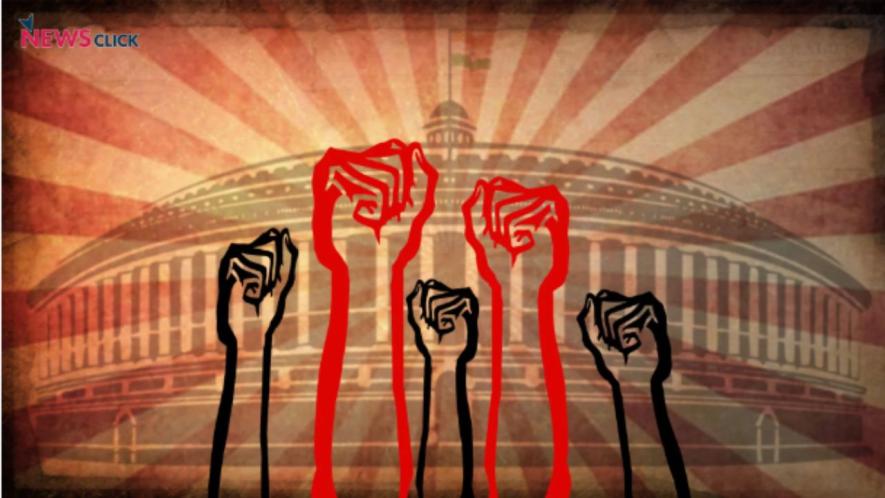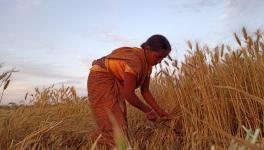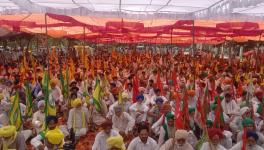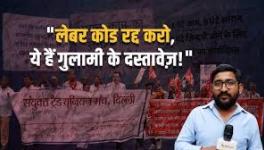Why a General Strike on July 9, 2025?

A historic and unprecedented protest action is going to take place in India on July 9, 2025. It is expected to be one of the biggest strikes in history, with crores of workers, employees and informal sector workers joining hands with farmers and agricultural labourers across the country to stop work and come out on the streets.
Apart from public and private sector industrial units, white collar employees in banking and insurance sectors, employees in offices and shops, transport and hospitality sector workers, gig workers, and lakhs of other working people will join the strike and observe protest actions like dharnas, public meetings, demonstrations, etc. Farmers and agricultural workers are expected to come out in large numbers across most districts in the country to hold ‘rasta roko’ programmes.
This gigantic protest is the convergence of deep anger and discontent among working people of India against the hostile policies of the Central and many state governments toward the people which have led to raging unemployment, back-breaking cost of living, stagnating incomes and an increasing restriction on protest through organised actions.
Legal remedies and rights are being restricted to stamp out any protests or dissent even as the corporate sections are being given freebies and right to unbridled exploitation. This has led to India getting divided by extreme inequality and inhuman disparities in wealth and earnings.
Who Has Called This strike?
The July 9 strike has been called for by the Joint Platform of Central Trade Unions with the umbrella organisation of farmers, the Samyukta Kisan Morcha (SKM), extending its full support to the call. The Joint Platform comprises 10 central trade unions and a host of independent federations and associations. It has held successful strikes and protests on several occasions in the past years. The SKM is a powerful broad front made up of scores of farmers and agricultural workers organisations that led the stupendous and successful farmers’ protests of 2020-21 against the three farm laws and for better prices for agricultural produce.
The strike call is also being supported by numerous civil society organisations, including the NREGA Sangharsh Morcha, Bhoomi Adhikar Andolan, food security-related organisations, and Dalit and adivasi/forest dwellers’ organisations.
All the Left parties have extended support to the strike and their activists and supporters have been working towards it. Other Opposition parties are expected to extend support.
What Are the Demands?
There is a concrete demand charter that is being pressed for by the protesting sections. The main features of this are as follows:
1. Scrap the four Labour Codes now.
2. National Minimum Wage of Rs.26,000 per month for all workers including unorganised sector workers, contract workers and scheme workers.
3. No casualisation of work in any form like outsourcing, fixed term employment, apprentices, trainees etc. under various schemes and pretexts. implement ‘Equal Pay for Equal Work’ for contract workers immediately.
4. Ensure minimum pension of Rs.9,000 per month and social security for all categories of workers, including unorganised workers and agricultural workers. Workers such as home-based workers, hawkers, rag-pickers, domestic workers, construction workers, migrant workers, scheme workers, agricultural workers, workers in shop/establishments, loading/unloading workers, gig workers, salt-pan workers, beedi workers, toddy-tappers, rickshaw-pullers, auto/rickshaw/taxi drivers, expatriate workers, fishing workers, etc. be registered and given portability in comprehensive social security, including pension.
5. Restore Old Pension Scheme (OPS). Scrap National Pension Scheme (NPS) and Unified Pension Scheme (UPS).
6. Removal of all ceilings on payment and eligibility of bonus and provident fund; increase quantum of gratuity
7. Compulsory registration of trade unions within a period of 45 days from submission of application. Immediate ratification of ILO (International Labour Organisation) conventions C87 and C98 related to right to organise and collective bargaining.
8. Control price rise, remove GST (goods and services tax) on essential items like food, medicines, agro-inputs and machinery, substantially reduce central excise duty on petroleum products and cooking gas. Guarantee food security and universalise the public distribution system.
9. Stop privatisation of Public Sector Enterprises and government departments. Scrap the National Monetisation Pipeline (NMP). Amend the existing law on mining of minerals and metals and ensure 50% share of profit from mines including coal mines for upliftment of local communities, especially adivasis and farmers.
10. MSP should be fixed at C2+50% for all farm produce with guaranteed procurement. Increase input subsidy to farmers on seed, fertilisers and electricity etc. with legal guarantee. Comprehensive loan waiver and crop insurance schemes. Implement written assurances given by the Union government to the SKM based on which the historic Kisan Struggle was suspended.
11. Withdraw the Electricity (Amendment) Bill, 2022. Stop privatisation of electricity. No pre-paid smart meters.
12. Right to Work be made a fundamental right. Fill sanctioned posts and generate employment for the unemployed. Expand and implement MGNREGS (200 days per year and Rs.600 per day wage). Enact an Urban Employment Guarantee Act.
13. Guarantee Right to Free Education, Right to Health, Water and Sanitation for all. Scrap the new National Education Policy 2020. Ensure housing for all.
14. Stringent implementation of the Forest Rights Act (FRA); Withdraw amendments to the Forest (Conservation) Act, 2023 and Bio-diversity Act and Rules that allow the Union government to permit clearance of a forest without even informing the residents. Ensure land to the tiller.
15. Give ESI (employee state insurance) coverage to construction workers, with contributions from the welfare fund, also give coverage of health schemes, maternity benefits, life and disability insurance to all workers registered on e-Shram Portal. Ratify ILO Conventions on Domestic Workers and Home-based Workers and make appropriate laws. Make a comprehensive policy on migrant workers, strengthen existing Inter-state Migrant Workmen (Regulation of Employment) Act, 1979 providing portability of their social security cover.
16. Tax the Super Rich; Enhance corporate tax; Re-introduce wealth tax and succession tax.
17. Stop attack on core values of the Constitution – freedom of expression, right to dissent, freedom of religion, diverse cultures, languages, equality before law and federal structure of the country etc.
How is the Preparation for Strike?
According to reports received at the headquarters of various trade unions and farmers organisations, a massive campaign to reach every worker and farmer/agricultural worker has been ongoing since the decision for strike was announced at a National Convention on 18 March, 2025. At that convention, the call was for a strike on May 20. But due to the Pahalgam terrorist attack and subsequent events, the strike was postponed to July 9.
An intensive campaign was carried out at the local level to reach out to every working person through Padayatras/jeep jathas/cycle jathas/motorbike jathas etc. Factory gate meetings /work place level/ residential area meetings of workers and the people at large have been held. Protest actions on sectoral demands, such as the Uttar Pradesh power sector workers struggle, have also strengthened the build- up to the July 9 strike.
Farmers’ organisations have been holding meetings across the country to mobilise agrarian community to participate in July 9 actions in villages.
Various sectoral federations, such as those of transport workers, port and dock workers, telecom workers, steel workers, coal and other mineral workers, garment and textile workers, automobile workers, fishing workers, government scheme workers, and many others have held large meetings.
Reports indicate that there is massive enthusiasm and support for the strike and protest actions. It is likely that there will be a major impact on normal life in many parts of the country.
Get the latest reports & analysis with people's perspective on Protests, movements & deep analytical videos, discussions of the current affairs in your Telegram app. Subscribe to NewsClick's Telegram channel & get Real-Time updates on stories, as they get published on our website.
























